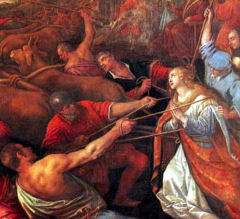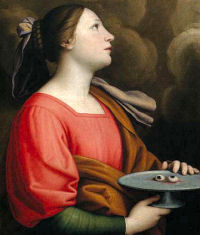Advent: December 13th
Memorial of St. Lucy, virgin and martyr
Other Titles: Lucia
» Enjoy our Liturgical Seasons series of e-books!
St. Lucy (283-304) was born in Syracuse, Sicily, where she also died. She was of a noble Greek family, and was brought up as a Christian by her mother, who was miraculously cured at the shrine of St. Agatha in Catania. Lucy made a vow of virginity and distributed her wealth to the poor. This generosity stirred the wrath of the unworthy youth to whom she had been unwillingly betrothed and who denounced her to Paschasius, the governor of Sicily. When it was decided to violate her virginity in a place of shame, Lucy, with the help of the Holy Spirit, stood immovable. A fire was then built around her, but again God protected her. She was finally put to death by the sword. Her name appears in the second list in the Canon.
St. Lucy (Lucia)
Today's feast can easily be harmonized with Advent themes. The very name Lucy pulsates with light, a living symbol amid the season's darkness (the days are now the shortest of the year). As a wise virgin Lucy advances with a burning lamp to meet the Bridegroom. She typifies the Church and the soul now preparing their bridal robes for a Christmas marriage.
That the famous Sicilian martyr really lived may be deduced from the great popular veneration accorded her since most ancient times. The Acts detailing her sufferings, however, merit little credence. According to these she made a pilgrimage to Catonia with her mother, who suffered from hemorrhage, to venerate the body of St. Agatha. After praying devoutly at the tomb, Agatha appeared to her in a dream and consoled her: "O virgin Lucy, why do you ask of me what you yourself can procure for your mother? For your faith too has come to her aid and therefore she has been cured. By your virginity you have indeed prepared for God a lovely dwelling." And her mother actually was healed.
 Immediately Lucy asked permission to remain a virgin and to distribute her future dowry among Christ's poor. Child and mother returned to their native city of Syracuse, and Lucy proceeded to distribute the full proceeds from the sale of her property among the poor. When a young man, to whom Lucy's parents had promised the virgin's hand against her will, had heard of the development, he reported her to the city prefect as a Christian. "Your words will be silenced," the prefect said to her, "when the storm of blows falls upon you!" The virgin: "To God's servants the right words will not be wanting, for the Holy Spirit speaks in us." "Yes," she continued, "all who live piously and chastely are temples of the Holy Spirit." "Then," he replied, "I shall order you put with prostitutes and the Holy Spirit will depart from you." Lucy: "If I am dishonored against my will, my chastity will secure for me a double crown of victory."
Immediately Lucy asked permission to remain a virgin and to distribute her future dowry among Christ's poor. Child and mother returned to their native city of Syracuse, and Lucy proceeded to distribute the full proceeds from the sale of her property among the poor. When a young man, to whom Lucy's parents had promised the virgin's hand against her will, had heard of the development, he reported her to the city prefect as a Christian. "Your words will be silenced," the prefect said to her, "when the storm of blows falls upon you!" The virgin: "To God's servants the right words will not be wanting, for the Holy Spirit speaks in us." "Yes," she continued, "all who live piously and chastely are temples of the Holy Spirit." "Then," he replied, "I shall order you put with prostitutes and the Holy Spirit will depart from you." Lucy: "If I am dishonored against my will, my chastity will secure for me a double crown of victory."
Aflame with anger, the judge imposed the threatened order. But God made the virgin solidly firm in her place and no force could move her. "With such might did the Holy Spirit hold her firm that the virgin of Christ remained immovable." Thereupon they poured heated pitch and resin over her: "I have begged my Lord Jesus Christ that this fire have no power over me. And in testimony of Him I have asked a postponement of my death." When she had endured all this without the least injury, they pierced her throat with a sword. Thus she victoriously ended her martyrdom.
—Excerpted from The Church's Year of Grace, Pius Parsch
Patronage: (adapted from Catholicsaints.info)
against ailments: against blindness; against dysentery; against epidemics; against eye disease; against eye problems; against hemorrhages; against sore eyes; against sore throats; against throat infections
protection: against fire; against poverty; against spiritual blindness; blind people; martyrs; peasants; penitent; prostitutes; poor people; sick children
professions: authors; cutlers; eyes; farmers; glass blowers and makers; glaziers; gondoliers; laborers; lamp lighters; lawyers; maid servants; notaries; ophthalmologists; opticians; porters; printers; saddlers; sailors; salesmen; seamstresses; stained glass workers; tailors; upholsterers; weavers; writers;
locations: Santa Lucia; Saint Lucy, Barbados; Begijnendijk, Flemish Brabant, Belgium; Carangola, Brazil; Mathias Lobato, Brazil; Rio Manso; Brazil; Santa Luzia; Brazil; Belpasso, Italy; Carlentini, Italy; Conzano, Italy; Saint Lucia del Mela, Italy; Mantua, Italy; Montecchio, Italy; Peccioli, Italy; Perugia, Italy; Santa Lucia di Piave, Italy; Syracuse, Sicily; Tavarnelle Val di Pesa, Italy; Venice, Italy; Villa Santa Lucia, Latium, Italy; Mtarfa, Malta; Santa Lucía, Nicaragua; Toledo, Spain
Symbols and Representation: cord; eyes; eyes on a dish or book; Lamp; awl; dagger; swords; three crowns; cauldron; two oxen; stake and fagots; cup; sword through neck; poniard; ropes; eye held in pincers
Often Portrayed As: Woman hitched to a yoke of oxen; woman in the company of Saint Agatha, Saint Agnes of Rome, Barbara, Catherine of Alexandria, and Saint Thecla; woman kneeling before the tomb of Saint Agatha
Highlights and Things to Do:
- Choose one of the customs for St. Lucy's feast and try it with your family. See
- Select one of the recipes for this feast to prepare. Of special mention is cuccia, an Italian dish. This is another version.
- See also Catholic Cuisine for some food ideas for this feast day.
- Learn more about St. Lucy:
- Say a prayer to St. Lucy for those who are physically and/or spiritually blind.
- Read the Life of St. Lucy taken from Ælfric’s Lives of the Saints written in the 10th century.
- For St. Lucia Swedish resources, see Hemslöjd. Especially recommended are the St. Lucia's Crowns, either plastic to wear or brass for display. Or make one, as suggested by this tutorial.
- We recommend the children's books:
- Lucia: Saint of Light by Katherine Bolger Hyde
- Lucia, Child of Light: The History and Traditions of Sweden's Lucia Celebration by Florence Ekstrand
- Lucia Morning in Sweden by Ewa Rydaker
- See the statue of St. Lucy at St. Peter's Basilica Colonnade.
- Christian Iconography has some beautiful iconography of St. Lucy.
- Find where St. Lucy's relics are located.






